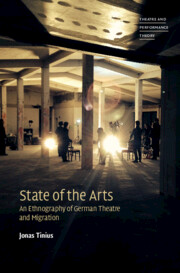‘In this truly captivating book, Jonas Tinius shows most convincingly anthropology´s unique quality to explain the large scale: Germany as a nation and ideas of Bildung in combination with recent migration, through a small scale case of contemporary theatre, the Theatre an der Ruhr. By including the concept 'ethico-aesthetic' the analysis opens up for further understandings of how ethical issues and practices complement aesthetic ones, importantly also further afield. Inspiring and impressive, State of the Arts is a game-changer.'
Helena Wulff - Professor Emerita of Social Anthropology, Stockholm University
‘State of the Arts is a (perhaps the first) genuine organisational ethnography of a German theatre. Tinius has written a groundbreaking study that links ethnographic fieldwork with fundamental insights into German theatre's institutional makeup to illuminate the remarkable Theater an der Ruhr.'
Christopher Balme - Professor of Theatre Studies, Ludwig Maximilian University of Munich
‘Tinius offers a refreshing and unique contribution to the anthropology of theatre, performance, and the arts by critically analyzing the conceptual, material, and historical constitution of an actual theatre, its repertoire, its traditions, and its actors. By framing the theatre as an 'extra-ordinary' field of ethical reflection and cultural production and describing in detail the rehearsal and production processes of the Theater, Tinius has made a significant anthropological contribution to ethnographic and theoretical discussions of theatricality and performativity and their uses for politics, society, and intellectual thought.’
Jenny Tang
Source: Anthropology Book Forum
‘… an excellent example of anthropology’s capacity to draw larger insights from local practices. … this book can be recommended as a foundational contribution to understanding state patronage for the arts in modern Germany.’
Rose Campion
Source: Ad Marginem. Randbemerkungen zur europäischen Musikethnologie
‘… the most valuable aspect of the book lies in its synthetic approach, freely combining the German aesthetic paradigm … with advanced anthropological reflections on contemporary art, performance, visual culture, arts, and politics. … [it] will be of interest for anthropologists working at the intersection of political and visual anthropology or interested in institutional ethnographies of experimental artistic spaces, with a keen focus on migration to Europe.'
Nataliya Tchermalykh
Source: Visual Anthropology Review
‘Against the contemporary backdrop of right-wing nationalisms and populist sentiment across the world, in a country steeped in authoritarian state history (Germany), Jonas Tinius’ ethnography highlights the ‘reflexive’ ethical possibilities of artistic practice in a public theatre institution.’
Matthew Raj Webb
Source: CaMP Anthropology
‘Tinius’s book is a rich exploration of the Theater an der Ruhr, weaving together an account of the theatre’s artistic and aesthetic principles, history, labour practices, and institutional framework. It is an exciting example of ethnographic exploration of a theatre, as well as window into the recent history of German performance cultures. It addresses the themes of theatre and migration, and specifically the German post-migrant theatre moment, in important and intriguing ways. State of the Arts charts important problematizations of the existing literature on theatre and migration in Germany, shedding light on the history of one company dedicated to bastardizing the role of theatre as an institute of civic nation-building.’
Misha Hadar
Source: Modern Drama



